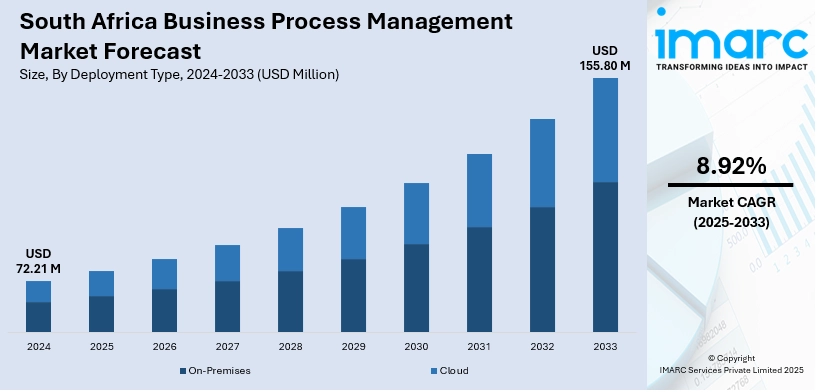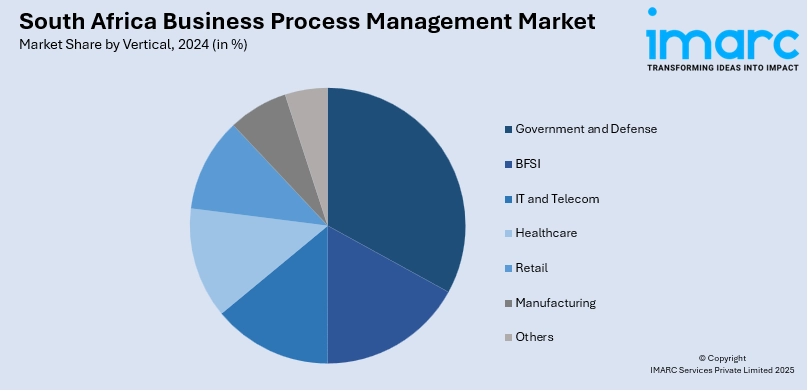
South Africa Business Process Management Market Size, Share, Trends and Forecast by Deployment Type, Component, Business Function, Organization Size, Vertical, and Province, 2025-2033
South Africa Business Process Management Market Overview:
The South Africa business process management market size reached USD 72.21 Million in 2024. Looking forward, IMARC Group expects the market to reach USD 155.80 Million by 2033, exhibiting a growth rate (CAGR) of 8.92% during 2025-2033. Companies in South Africa are placing more emphasis on enhancing operational efficiency, which is facilitating the implementation of comprehensive solutions. Apart from this, South African businesses are rapidly transforming digitally, and this factor is supporting the market growth. Moreover, the increasing need for better customer experience and agility is expanding the South Africa business process management (BPM) market share.
|
Report Attribute
|
Key Statistics
|
|---|---|
|
Base Year
|
2024 |
|
Forecast Years
|
2025-2033
|
|
Historical Years
|
2019-2024
|
| Market Size in 2024 | USD 72.21 Million |
| Market Forecast in 2033 | USD 155.80 Million |
| Market Growth Rate 2025-2033 | 8.92% |
South Africa Business Process Management Market Trends:
Increasing Emphasis on Operational Efficiency Across Businesses
Companies in South Africa are placing more emphasis on enhancing operational efficiency, which is facilitating the implementation of business process management (BPM) solutions. Companies are now optimizing repetitive activities, automating mundane operations, and harmonizing business objectives with process workflows to maximize productivity and minimize expenditure. BPM software is being used to streamline bottlenecks, enhance the utilization of resources, and track real-time performance, thus enabling companies to make informed decisions. Businesses are also turning to BPM to implement regulatory compliance, monitor performance metrics, and deliver consistent services across departments. In this increasingly competitive market, firms are re-engineering primary business processes continuously in order to achieve a competitive advantage and respond rapidly to changes in the market. With the persisting economic pressures coupled with changing customer requirements, South African companies are increasingly adopting BPM software to remain effective. The heightened need for improved business continuity, transparency, and accountability is driving the adoption of BPM in different industries. Flokzu recognized as a global frontrunner in business process management and automation (BPM), officially inaugurated its operations in South Africa in 2025. During a special event on 26 February, held at the Hyperclear Hive in Stellenbosch, participants were presented with Flokzu’s effective automation solutions, demonstrating how companies can enhance operations, boost efficiency, and speed up digital transformation without needing technical skills.

To get more information on this market, Request Sample
Increasing Digital Transformation and Automation Initiatives
South African businesses are rapidly transforming digitally, and this factor is supporting the South Africa business process management (BPM) market growth. Companies are embedding cutting-edge technologies like artificial intelligence (AI), robotic process automation (RPA), and cloud computing in their BPM platforms to automate operations, reduce human touchpoints, and speed up service delivery. This transformation is helping companies enhance end-to-end processes, improve customer experience, and gain real-time visibility into operations. Government and business organizations are constantly modernizing their legacy systems, embracing digital-first approaches, and spending on agile BPM platforms to drive innovation. Additionally, the heightened trend of remote and hybrid work patterns is further encouraging businesses to adopt cloud-based BPM solutions that provide accessibility, collaboration, and scalability. With businesses attempting to keep pace with the needs of digitally empowered customers, they are making greater dependence on BPM for filling technology gaps and enabling long-term business change. South Africa is also conducting the 45th edition of the Digital Transformation Summit in 2026 to share insights on the processes of transformation of business operations and provide value to customers.
Increased Need for Better Customer Experience and Agility
South African organizations are giving greater importance to customer-centric strategies, and this is driving the need for BPM solutions that help enhance responsiveness and tailor customer service. In a very competitive market, companies are now using BPM to develop adaptable, customer-focused processes that respond rapidly to shifting needs and desires. BPM platforms are helping companies cut response times, remove process redundancies, and provide seamless experiences across digital and physical channels. Organizations are constantly tracking customer experiences, interpreting feedback, and optimizing business processes in real time to enhance satisfaction and loyalty. This is especially important in industries like banking, telecommunication, and healthcare, where customer expectations are high and delivery of services needs to be quick and precise. The capacity of BPM solutions to yield flexible process adaptation and quicker innovation cycles is proving to be essential in addressing customers' needs and maintaining growth.
South Africa Business Process Management Market Segmentation:
IMARC Group provides an analysis of the key trends in each segment of the market, along with forecasts at the country and regional levels for 2025-2033. Our report has categorized the market based on deployment type, component, business function, organization size, and vertical.
Deployment Type Insights:
- On-Premises
- Cloud
The report has provided a detailed breakup and analysis of the market based on the deployment type. This includes on-premises and cloud.
Component Insights:
- IT Solution
- Process Improvement
- Automation
- Content and Document Management
- Integration
- Monitoring and Optimization
- IT Service
- System Integration
- Consulting
- Training and Education
The report has provided a detailed breakup and analysis of the market based on the component. This includes IT solution (process improvement, automation, content and document management, integration, and monitoring and optimization) and IT service (system integration, consulting, and training and education).
Business Function Insights:
- Human Resource
- Accounting and Finance
- Sales and Marketing
- Manufacturing
- Supply Chain Management
- Operation and Support
- Others
The report has provided a detailed breakup and analysis of the market based on the business function. This includes human resource, accounting and finance, sales and marketing, manufacturing, supply chain management, operation and support, and others.
Organization Size Insights:
- SMEs
- Large Enterprises
The report has provided a detailed breakup and analysis of the market based on the organization size. This includes SMEs and large enterprises.
Vertical Insights:

- Government and Defense
- BFSI
- IT and Telecom
- Healthcare
- Retail
- Manufacturing
- Others
A detailed breakup and analysis of the market based on the vertical have also been provided in the report. This includes government and defense, BFSI, IT and telecom, healthcare, retail, manufacturing, and others.
Province Insights:
- Gauteng
- KwaZulu-Natal
- Western Cape
- Mpumalanga
- Eastern Cape
- Others
The report has also provided a comprehensive analysis of all the major regional markets, which include Gauteng, KwaZulu-Natal, Western Cape, Mpumalanga, Eastern Cape, and others.
Competitive Landscape:
The market research report has also provided a comprehensive analysis of the competitive landscape. Competitive analysis such as market structure, key player positioning, top winning strategies, competitive dashboard, and company evaluation quadrant has been covered in the report. Also, detailed profiles of all major companies have been provided.
South Africa Business Process Management Market Report Coverage:
| Report Features | Details |
|---|---|
| Base Year of the Analysis | 2024 |
| Historical Period | 2019-2024 |
| Forecast Period | 2025-2033 |
| Units | Million USD |
| Scope of the Report |
Exploration of Historical Trends and Market Outlook, Industry Catalysts and Challenges, Segment-Wise Historical and Future Market Assessment:
|
| Deployment Types Covered | On-Premises, Cloud |
| Components Covered |
|
| Business Functions Covered | Human Resource, Accounting and Finance, Sales and Marketing, Manufacturing, Supply Chain Management, Operation and Support, Others |
| Organization Sizes Covered | SMEs, Large Enterprises |
| Verticals Covered | Government and Defense, BFSI, IT and Telecom, Healthcare, Retail, Manufacturing, Others |
| Provinces Covered | Gauteng, KwaZulu-Natal, Western Cape, Mpumalanga, Eastern Cape, Others |
| Customization Scope | 10% Free Customization |
| Post-Sale Analyst Support | 10-12 Weeks |
| Delivery Format | PDF and Excel through Email (We can also provide the editable version of the report in PPT/Word format on special request) |
Key Questions Answered in This Report:
- How has the South Africa business process management market performed so far and how will it perform in the coming years?
- What is the breakup of the South Africa business process management market on the basis of deployment type?
- What is the breakup of the South Africa business process management market on the basis of component?
- What is the breakup of the South Africa business process management market on the basis of business function?
- What is the breakup of the South Africa business process management market on the basis of organization size?
- What is the breakup of the South Africa business process management market on the basis of vertical?
- What is the breakup of the South Africa business process management market on the basis of province?
- What are the various stages in the value chain of the South Africa business process management market?
- What are the key driving factors and challenges in the South Africa business process management market?
- What is the structure of the South Africa business process management market and who are the key players?
- What is the degree of competition in the South Africa business process management market?
Key Benefits for Stakeholders:
- IMARC’s industry report offers a comprehensive quantitative analysis of various market segments, historical and current market trends, market forecasts, and dynamics of the South Africa business process management market from 2019-2033.
- The research report provides the latest information on the market drivers, challenges, and opportunities in the South Africa business process management market.
- Porter's five forces analysis assist stakeholders in assessing the impact of new entrants, competitive rivalry, supplier power, buyer power, and the threat of substitution. It helps stakeholders to analyze the level of competition within the South Africa business process management industry and its attractiveness.
- Competitive landscape allows stakeholders to understand their competitive environment and provides an insight into the current positions of key players in the market.
Need more help?
- Speak to our experienced analysts for insights on the current market scenarios.
- Include additional segments and countries to customize the report as per your requirement.
- Gain an unparalleled competitive advantage in your domain by understanding how to utilize the report and positively impacting your operations and revenue.
- For further assistance, please connect with our analysts.
 Request Customization
Request Customization
 Speak to an Analyst
Speak to an Analyst
 Request Brochure
Request Brochure
 Inquire Before Buying
Inquire Before Buying




.webp)




.webp)












